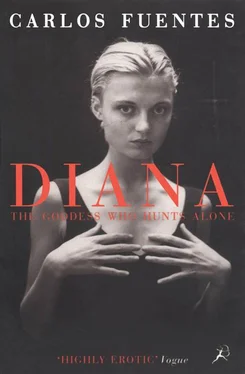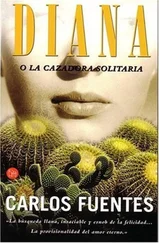Carlos Fuentes - Diana the Goddess Who Hunts Alone
Здесь есть возможность читать онлайн «Carlos Fuentes - Diana the Goddess Who Hunts Alone» весь текст электронной книги совершенно бесплатно (целиком полную версию без сокращений). В некоторых случаях можно слушать аудио, скачать через торрент в формате fb2 и присутствует краткое содержание. Год выпуска: 2012, Издательство: Bloomsbury UK, Жанр: Современная проза, на английском языке. Описание произведения, (предисловие) а так же отзывы посетителей доступны на портале библиотеки ЛибКат.
- Название:Diana the Goddess Who Hunts Alone
- Автор:
- Издательство:Bloomsbury UK
- Жанр:
- Год:2012
- ISBN:нет данных
- Рейтинг книги:3 / 5. Голосов: 1
-
Избранное:Добавить в избранное
- Отзывы:
-
Ваша оценка:
- 60
- 1
- 2
- 3
- 4
- 5
Diana the Goddess Who Hunts Alone: краткое содержание, описание и аннотация
Предлагаем к чтению аннотацию, описание, краткое содержание или предисловие (зависит от того, что написал сам автор книги «Diana the Goddess Who Hunts Alone»). Если вы не нашли необходимую информацию о книге — напишите в комментариях, мы постараемся отыскать её.
Diana the Goddess Who Hunts Alone — читать онлайн бесплатно полную книгу (весь текст) целиком
Ниже представлен текст книги, разбитый по страницам. Система сохранения места последней прочитанной страницы, позволяет с удобством читать онлайн бесплатно книгу «Diana the Goddess Who Hunts Alone», без необходимости каждый раз заново искать на чём Вы остановились. Поставьте закладку, и сможете в любой момент перейти на страницу, на которой закончили чтение.
Интервал:
Закладка:
But in the course of that night’s insomnia, which diminished my own passion considerably, another certainty asserted itself little by little, involuntarily, an idea that was part of me though I hadn’t formulated it clearly. I was sorry, I said to myself. Both within myself and in the outside world, I saw manifested the idea that civilized life respects laws while savage life disdains them. I didn’t want to say it or even think it, because it contradicted or, in its own way, disparaged the sorrow I could feel in the rage of Diana’s black lover. Yet despite that, I was as repelled by the idea of black supremacy as of white supremacy. I couldn’t put myself in the shoes of that unknown interlocutor. I didn’t need to tell Diana I couldn’t jive, didn’t swing to black street rhythms …
I wanted to be sincere and to imagine myself, on the other hand, in the sandals of that boy who’d played the part of Juárez. Would I have helped the boy Juárez? Would I have helped him become what he became — a white Indian, a Zapotec with the Napoleonic Code for his pillow, a Cartesian lawyer, a Republican shyster instead of a shaman, a paper pusher instead of a sorcerer in contact with nature and death, animator of the inanimate, owner of things that cannot be possessed, millionaire of misery? What would I have done for the boy Juárez?
Nothing. Diana’s black — her Panther, I decided to call him — knew me better than I knew him and maybe even better than I knew myself. He knew that I could take everything away from him whenever I wanted. Everything. The castrated, hanged, lynched blacks, like milestones in American history — they are also a book of martyrs for innocent blacks. The Panther decided he would no longer be the victim. God never stopped the homicidal hand of the white Abraham when he sank his dagger into the heart of his son, the black Isaac.
XXV
I had a bad morning, but at lunchtime I decided to visit the club and see if General Agustín Cedillo was there, as he was every day. In the old-fashioned way, he was drinking a cognac before lunch and invited me to sit with him. I had a beer instead of a cognac because no beer in the world is better than ours. It made me feel rather chauvinist, but I was thankful for that feeling. I remembered what Diana had told me James Baldwin said — that a black and a white, because they’re both Americans, know more about themselves and one another than any European knows about either of them. The same thing is true of Mexicans.
The other night I had felt class hatred flare up between the general and me. This afternoon the beer raised my spirits and made me recognize myself in him. In one voice we both ordered “two Tehuacans,” knowing well that in no other part of the world would anyone understand what that mineral water was. Then he invited me to join him. The ritual of dining — from ordering quesadillas with huitlacoche (only we Mexicans understand and enjoy eating the black cancer of corn) to being handed a basket of hot tortillas and delicately picking one out, spreading guacamole on it, adding a dash of chile, and rolling it all up; from the diminutive and possessive references to all edibles (your little beans, your little chiles, your little tortillas) to the guarded, familiar, tender allusions to health, weather, age (he’s not well, the rain’s letting up, he’s getting so elderly) — created a favorable climate for bringing up the theme that concerned me. It also allowed me to free myself, in an involvement the general knew nothing of, from the extreme alienation, still buzzing in my ears, of that pair Diana Soren and her Panther. They were other. But everything at the table was Mexican, right down to my possessive when I addressed General Cedillo: My general, my general, dear, oh dear. That was it: he was mine.
“You said the other night that my girlfriend should be careful. Why?”
“Look, my friend, I’m not a professional suspicion monger. I don’t go around seeing enemies behind every tree. But the fact is, here and there agitators do exist. You understand me. We wouldn’t want Miss Soren to find herself compromised for an indiscretion.”
“Do you mean Black Panthers there and the League guerrillas here?”
“Not exactly. I mean FBI everywhere, that’s what I mean. Watch out.”
“What do you suggest I do?”
“You’re a friend of the gentleman who runs the Department of Internal Affairs.”
“You mean Mario Moya Palencia. We went to school together. He’s an old, close friend.”
“Go visit him in Mexico City. Be careful. Watch out for your girlfriend. It’s not worth the trouble.”
When Diana came back that night, I told her I’d be leaving for Mexico City the next day. I had to attend to some unfinished business. She knew I’d left everything hanging in midair to follow her to Santiago. In a few days, a week at the most, I’d be back. She looked at me with a melancholy expression, trying to guess the truth, imagining that perhaps I’d guessed the truth about her but laying open a range of possibilities. How much did I know? Was this the end? Was I leaving for good? Was this the end of our relationship? Was I being drawn back by my wife, my daughter, my business in the capital?
“I’m leaving everything here — my books, my papers, my typewriter …”
“Take the toothpaste with you.”
Nothing lessened the sadness in her eyes.
“Just one tube. Everything else stays in the pawnshop.”
“In the pawnshop? I like that. Maybe all of us are only in the pawnshop here.”
“Don’t start imagining God as some Jewish pawnbroker.”
“No. But I do believe in God. So much, you know, that I can’t imagine He put us on earth just to be no one.”
“I love you, Diana.” I kissed her.
XXVI
The first thing I did when I got back to Mexico City was to call my friend Luis Buñuel and ask to see him. Once or twice a month I’d visit him between four and six in the afternoon. His conversation nourished and stimulated me in extraordinary ways. Buñuel not only had witnessed the century (they were coevals — he was born in 1900) but had been one of its greatest creators. Everyone knows that, even as they demand automatic writing and a “disordering of the senses,” the French theoreticians of surrealism have given us beautiful essays and other texts written with Cartesian clarity. Beyond mere provocation, the French Surrealists seem not to compromise their rationalist culture or to give it back that blast of madness that must have animated Villon or Rabelais. But the Surrealists without theory, the intuitive ones like Buñuel in Spain or Max Ernst in Germany, succeed in incorporating their culture into their art, giving the past a critical presence and placing historically perverse limits on modern pretensions to novelty. Everything is rooted in distant memories and ancient soil. Dig them up and true modernity bursts forth: the presence of the past, a warning against the pride of progress. The Spanish mystics, the picaresque novel, Cervantes, and Goya were the fathers of Buñuel’s surrealism, just as the cruel, excessive nocturnal fantasy of the Germanic fairy tale was mother to Ernst.
Buñuel’s house in Colonia del Valle lacked all character. That, in effect, was its character: it had none. A two-story red brick building, it looked like any middle-class house in the world. The living room resembled a dentist’s waiting room, and although I never saw the artist’s bedroom, I know he liked to look at bare walls and to sleep on the floor or, at most, on a wooden bed with no mattress or springs. Those penances fit nicely with his strict morality, oppressively bourgeois and puritanical for some, ascetically monastic for others. His house was almost devoid of decoration, except for a portrait of Buñuel as a young man painted by Dalí in the 1920s. Since World War II they’d been enemies, but Luis kept the portrait in his vestibule as a heartfelt homage to his youth and also to a lost friendship …
Читать дальшеИнтервал:
Закладка:
Похожие книги на «Diana the Goddess Who Hunts Alone»
Представляем Вашему вниманию похожие книги на «Diana the Goddess Who Hunts Alone» списком для выбора. Мы отобрали схожую по названию и смыслу литературу в надежде предоставить читателям больше вариантов отыскать новые, интересные, ещё непрочитанные произведения.
Обсуждение, отзывы о книге «Diana the Goddess Who Hunts Alone» и просто собственные мнения читателей. Оставьте ваши комментарии, напишите, что Вы думаете о произведении, его смысле или главных героях. Укажите что конкретно понравилось, а что нет, и почему Вы так считаете.












